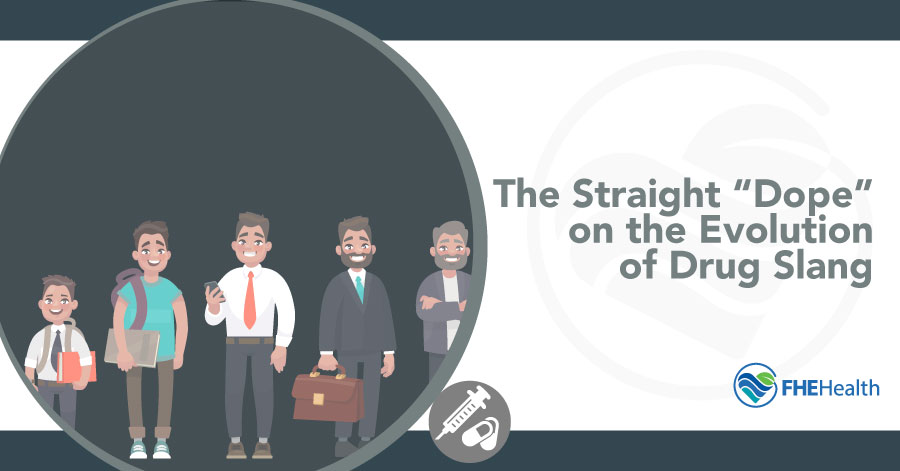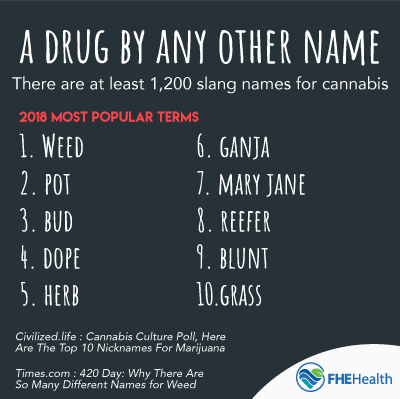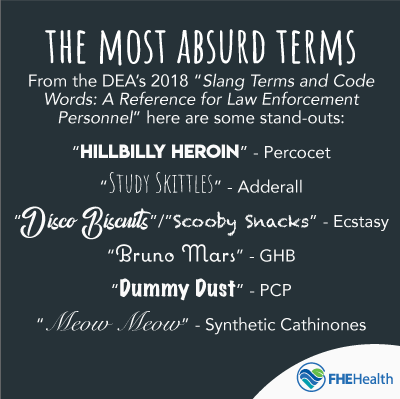
Updated November 8, 2024
We’ve all heard terms like “dope,” “smack,” “speed,” and “nose candy” to describe illegal drugs on television in the schoolyard and recovery meetings and addiction treatment programs. Drug dealers and users have used drug slang, also known as drug street names, for decades, and it’s an integral part of the drug culture, both in the United States and abroad.
Why Does Drug Slang Exist?
 Like all types of jargon, drug slang primarily evolved as a way for those involved in the illegal drug trade to avoid detection by the authorities. Giving specific drugs unique names makes communication easier between people in the drug culture while keeping the true nature of their conversation relatively confidential.
Like all types of jargon, drug slang primarily evolved as a way for those involved in the illegal drug trade to avoid detection by the authorities. Giving specific drugs unique names makes communication easier between people in the drug culture while keeping the true nature of their conversation relatively confidential.
It’s unclear when slang terms for illicit drugs became the norm, but it’s likely that the military practice of assigning code names to covert missions to mislead the enemy inspired the practice of developing secret names for drugs.
Drug slang also serves as a way for drug users and dealers to identify those who are considered to be within the inner circle of the drug culture and keep law enforcement officials from penetrating drug circles. Drug slang often serves as a type of password that’s used to access illegal drugs. People who don’t know the latest slang terms are quickly labeled as untrustworthy and kept out of the loop.
Is There State-Specific Drug Slang?
Yes.
Drug slang is often specific to a certain city, state, or region. For example, cocaine can be called “flake” in California, “nose candy” in Washington, and “coca” in Texas. MDMA is coined “roll” in New York, “vitamin E” in Montana, Arizona and Michigan, and “moon rock” in California, Oregon and Idaho.
Some street drug terms are relatively universal, such as “speed,” which refers to methamphetamine.
Drug Slang in Popular Music
Drug slang is often present in song lyrics. The “yellow diamonds” in Rihanna’s hit song, “We Found Love,” are widely rumored to be a reference to methylenedioxy-methamphetamine, better known as “ecstasy,” “E,” “MDMA,” or “Adam.”
When the Beatles ruled the radio, the group penned “Got To Get You Into My Life,” a song that Paul McCartney says, “[is] actually an ode to pot, like someone else might write an ode to chocolate or a good claret.” More obviously, a year later, they penned [L]ucy in the [S] ky with [D]iamonds, a fairly blatant reference in the name, and in the song’s context, to LSD.
The Rolling Stones have recorded numerous songs with drug slang in the lyrics, the most notable ones being “Mother’s Little Helper” (Valium or diazepam) and “Brown Sugar,” also known as “Smack,” “Junk” and “Skag:” a cheap, semi-synthetic opioid created from extracted morphine and cut with a filler like chalk powder or zinc oxide.
 Many terms used to describe
Many terms used to describe 





